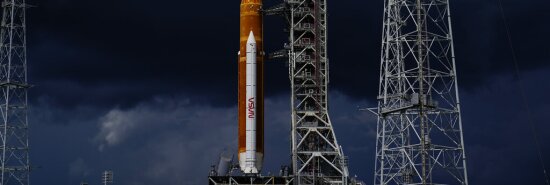
China is afraid of NASA’s Artemis return to the moon
Mark Whittington
Video Embed
Recently, NASA Administrator Bill Nelson warned that the U.S. and her allies are engaged in a space race with China. The prize is the mineral and energy riches of the moon. Nelson even suggested that the Chinese Communist Party will violate the Outer Space Treaty and claim the moon as its sovereign territory. He noted China’s behavior on Earth, particularly in regard to the South China Sea.
China Military Online, the English language organ of the Chinese People’s Liberation Army, responded to Nelson and others who have highlighted the Chinese space threat:
“Since taking office as head of NASA, Bill Nelson has repeatedly accused China of peaceful space exploration activities, falsely claiming that China’s space program is a military program and groundlessly accusing China’s aerospace industry of stealing technology and ideas from other countries. Arguments like this are not uncommon in American political and military sectors. The U.S. has spared no effort to distort the facts and label other countries as ‘space competitors’ and ‘space threats’, aiming to create excuses to seek space superiority. This reflects the hegemonic thinking and Cold War thinking of the U.S.”
The first sentence is confusing since Nelson has accused China of being far from peaceful in any of its activities. Nevertheless, the article goes on to accuse the U.S. of trying to do what the U.S. accuses China of attempting — establishing an outer space “hegemony.” The piece even invokes Rear Admiral Alfred Mahan by accusing the U.S. of applying his theory of sea power to space.
TO THE STARS: FCC APPROVES AMAZON-FUNDED BROADBAND SATELLITE NETWORK FOR LAUNCH
The article concludes with some demands. “As a major power in the world, the US should abandon the Cold War mentality as soon as possible, take a correct view of other countries’ aerospace achievements, and strive to make space benefit all mankind, instead of an arena for space hegemony.”
The misunderstanding, deliberate or not, of American space policy on the part of the Chinese government, is breathtaking. The U.S. is applying a space version of Mahan’s theory of space power, but not because it wants to establish hegemony beyond the Earth. The reason is that it wants to prevent Beijing from achieving space dominance.
One piece of proof that the U.S. is not attempting to create an empire beyond the Earth is the Artemis Accords. The accords spell out the rules for cooperation among the signatories to avoid conflict. The agreement covers access to space resources, the protection of heritage sites, and the release of scientific data among other issues. The Artemis Accords are being advanced through appeals to self-interest and not coercion.
Another proof is that NASA provides assistance to lunar probes launched by other nations. Both the Japanese Hakuto lander and the Israeli Beresheet 2 missions enjoy support from the American space agency on the basis of mutual benefit. Astronauts from allied countries will fly on future Artemis missions to the moon, starting with a Canadian on Artemis II.
In the meantime, the Chinese are having a hard time getting willing partners for their space projects. The European Space Agency has foregone sending its astronauts to the Tiangong space station. China is reaching out to a number of Middle Eastern countries, so far without success. Russia, which would seem a natural space partner for China, has degraded its usefulness because of the cost of its invasion of Ukraine.
China is afraid of the American Artemis program. It should be. Artemis and other aspects of American space policy, such as the Space Force, are designed, in part, to prevent Beijing from dominating space and its resources and thus, the Earth. China feels that it needs such dominance to help alleviate the self-inflicted economic and demographic problems it faces.
China can enjoy a share of the riches of the space frontier, but only if it stops the sort of behavior that has angered Western nations. It should stop its industrial and cyber espionage, its aggressive stance toward Taiwan, and its human rights abuses. Then it should sign, rather than oppose, the Artemis Accords. Only then can Beijing become a full partner in expanding human civilization to the cosmos.
CLICK HERE TO READ MORE FROM THE WASHINGTON EXAMINER
Mark Whittington, who writes frequently about space and energy policy, has published a political study of space exploration entitled Why is It So Hard to Go Back to the Moon? as well as The Moon, Mars and Beyond, and, most recently, Why is America Going Back to the Moon? He blogs at Curmudgeons Corner.
